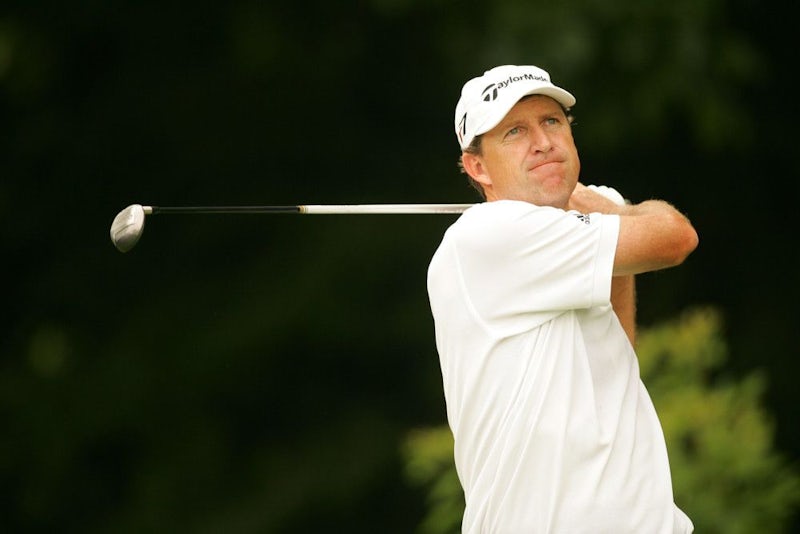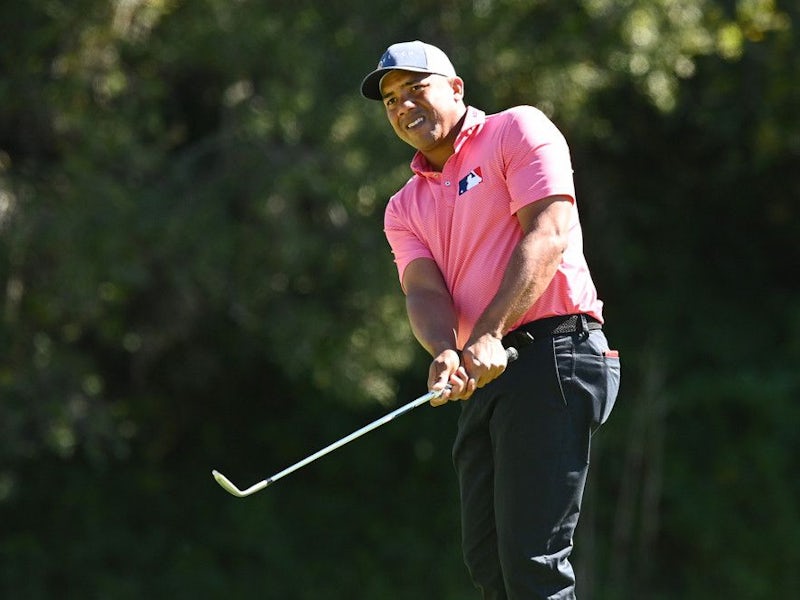ADVERTISEMENT
The biggest upsets in U.S. Open history

Steve Jones at the 2006 U.S. Open Championship. (Photo by Darren Carroll/Icon Sportswire)
The U.S. Open role of honor includes the usual suspects. Tiger Woods’ name appears three times, Ben Hogan and Jack Nicklaus are each there four times, and Brooks Koepka, Jordan Spieth, Rory McIlroy, and Dustin Johnson all pop up in the last decade.
But in and amongst those household names are a handful of shocking winners that came completely out of left field. Here are the five biggest upsets in U.S. Open history.
5. Francis Ouimet (1913 U.S. Open)
The U.S. Open has only been won eight times by an amateur player, and it's been 88 years since that last occurred. The first time was 1913, when it was won by Francis Ouimet, the golfer known to many as "The Father of Amateur Golf."
The tournament was expected to be a showdown between the well fancied British duo of Harry Vardon and Ted Ray. But little-known amateur Francis Ouimet, who lived in Massachusetts, virtually opposite the 17th green, had plenty of experience at the Country Club and kept pace with the two favorites.
Happy birthday to the man who played the greatest game ever: Francis Ouimet, born 125 years ago. pic.twitter.com/jiT28f3Pt0
— USGA (@USGA) May 8, 2018
The trio were tied by the end of the third round, and all shot 79 in the final round to go to an 18-hole play-off. 20-year-old Ouimet shot 72 to win by six shots in one of the biggest upsets in U.S. Open history.
4. Orville Moody (1969 U.S. Open)
Moody was a 14-year army veteran who gave up his military career in favor of a run at the PGA Tour in 1967. Two years later, "Sarge" won the U.S. Open. He came through local and sectional qualifying to earn his place in the field, and despite having never won a tournament, found himself within a shot of the leaders at the start of the fourth round.
After a 14-year military career, Orville Moody made it through #USOpen qualifying and won the title at Champions GC in 1969. #VeteransDay pic.twitter.com/Xcdz1AgWnM
— U.S. Open (USGA) (@usopengolf) November 11, 2017
Miller Barber’s three-shot lead vanished in the blink of an eye as he shot eight-over-par, and that allowed Moody to swoop in and win by a stroke. It remains the only PGA Tour event Moody won, and he’s the last player to have won after coming through local and sectional qualifying.
3. Sam Parks Jr. (1935 U.S. Open)
Practice makes perfect, and that was certainly the case for Sam Parks Jr. in 1935. The U.S. Open was held at Oakmont Country Club in Pennsylvania that year, just down the road from South Hills Country Club where Parks was a pro.
Every day for a month, Parks stopped off at Oakmont to play 18 holes, so he could get used to the notoriously difficult greens.
Sam Parks wins the 1935 US Open at Oakmont - pic.twitter.com/2tkbH17Do6
— TheGolfDivoTee™ (@TheGolfDivoTee) May 3, 2021
It did the trick, as Parks was the only man to break 300 at Oakmont, and won by two shots over Jimmy Thomson. Parks three-putted just twice in 72 holes and pocketed $1,000 for his efforts.
2. Jack Fleck (1955 U.S. Open)
NBC actually stopped their coverage of the 1955 U.S. Open before Fleck had won. Like everybody else in the country, they thought the title belonged to Ben Hogan, who was in the clubhouse with a two-shot lead.
But Fleck birdied the 15th and 18th to send it to an 18-hole play-off the next day. The big underdog, Fleck had a two-shot lead turning for home and it was three strokes after a birdie on the 10th. Hogan chipped away and there was only one stroke between them on the 18th tee. Fleck held his nerve, though, and carded a par as Hogan could only manage a double bogey.
"One thing I love about golf is that you win on what you produce." -Jack Fleck | #MondayMotivation pic.twitter.com/MRDT98QWaK
— USGA (@USGA) December 9, 2019
Fleck had driven for 49 hours from Iowa to San Francisco for the tournament, but the way home likely felt a whole lot sweeter.
1. Steve Jones (1996 U.S. Open)
Jones won four PGA Tour events across 16 moths in the late 1980s, but his fantastic momentum came to a shocking end when he suffered ligament damage to his left ring finger in a dirt bike accident which forced him to step away from golf for three years.
He returned in 1995, and despite five top 10 finishes since his comeback, he was still an underdog for the U.S. Open in Michigan in 1996. In fact, he had to come through qualifying, and then shot 74 through the first round to sit seven shots off the lead.
Happy birthday to 1996 #USOpen champion Steve Jones! 🥳
— U.S. Open (USGA) (@usopengolf) December 27, 2020
In celebration, let's take a look back at the first sectional qualifier to win the championship since Jerry Pate in 1976. 👀 pic.twitter.com/sjjTSucsvS
A round of 66 got him back in the hunt, and he followed up with a pair of 69s as some of golf’s biggest stars faded. Tom Lehman and Davis Love III had taken over from Payne Stewart and Ernie Els to duke it out, but Jones battled on with his improvised reverse grip and won by a stroke.
ADVERTISEMENT


